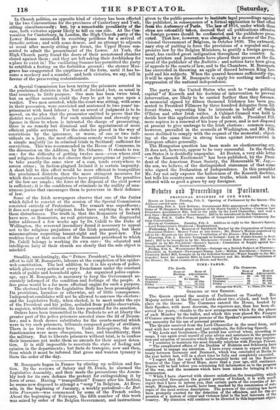A Special Commission has been trying the prisoners arrested in
the proclaimed districts in the North of Ireland • but, as usual in that country, to little purpose. One man has been twice tried, but on neither occasion could the Jury be got to agree upon a verdict. Two men arrested, while the court was sitting, with arms in their possession, were convicted and sentenced to two years' im- prisonment with hard labour ; but an arrest of judgment is to be moved, on the plea that the prosecutor omitted to prove that the district was proclaimed. For such scandalous and slovenly neg- ligence in those to whom is intrusted the charge of prosecuting, there is no remedy but dismissal and the appointment of more efficient public servants. For the obstacles placed in the way of convictions by the ignorance, or worse, of one or two indi- viduals on a Jury, the most efficacious remedy would be to make a simple majority (as in criminal trials in Scotland) sufficient for conviction. majority was recommended in the House of Commons, in the discussion on the Address, by Mr. Osborne. It stands to rea- son : for the difficulty of getting twelve men—even where civil and religious factions do not obscure their perceptions of justice— to take exactly. the same view of a case, tends everywhere to screen crime ; in faction-plagued Ireland it is certain impunity. A short bill to this effect would be more efficient to tranquillize the proclaimed districts than the more stringent measures for which their assembled magistrates have petitioned. The penalties of the law are ample ; the force at the disposal of the civil power is sufficient; it is the confidence of criminals in the nullity of una- nimous juries that encourages them to persevere in their defiance of law.
Some of the Irish newspapers observe that one of the Juries which failed to convict at the session of the Special Commission consisted entirely of Protestants. The remark was superfluous ; it does not appear that religious feuds have anything to do with those disturbances. The truth is, that the Romanists of Ireland have now, as Romanists, no real grievances. In the disgraceful letter addressed a few weeks ago by Dr. Cahill to the Duke of Wellington, the reverend incendiary found it necessary to appeal not to the religious prejudices of the Irish peasantry, but their misconceptions respecting tenant-right and the poor-law. The reckless tone of that section of the Romanist priesthood to which Dr. Cahill belongs is working its own cure : the educated and intelligent laity of their church see clearly that the sole object is mischief.


























 Previous page
Previous page